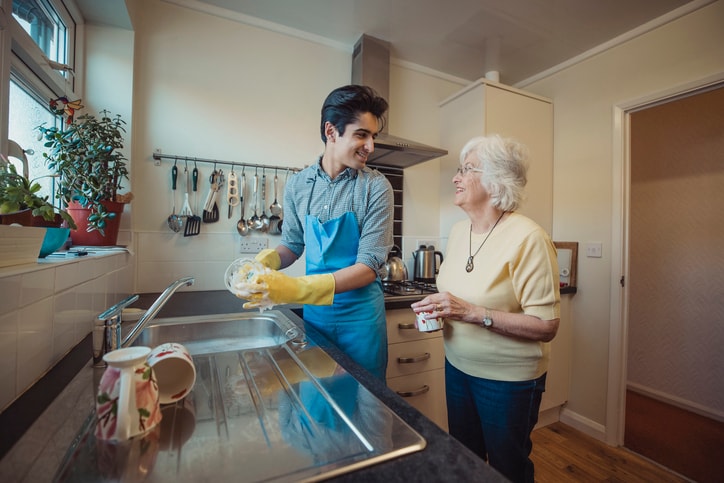Does your dog cling to your leg, whine and tremble when you expose him to new people, animals, places or things? If he seems particularly nervous in day-to-day situations, he might be suffering from dog anxiety. Here’s an overview on this behavioral disorder and what you can do to help your furry friend gain the confidence he needs to overcome his nervous tendencies.
What Are the Symptoms of Dog Anxiety?
Dogs who are experiencing anxiety may shake, be skittish and have an overwhelming look of fear in their eyes, says Andrew Horan, the owner and head trainer at Citizen K9 in Gainesville, Virginia. Depending on the severity of your dog’s anxiety, she might follow you like a shadow and insist on being in constant physical contact with you. If you keep your pup in a crate, she might also try to break free in an attempt to come between you and strangers with whom she is unfamiliar. In this scenario, her protective tendencies may encourage her to growl at or bite these unknown figures.
Additional telltale symptoms of dog anxiety include heavy panting, drooling, pacing and sweating paws. When your dog has a nervous episode, she might also partake in destructive chewing or tuck her tail for a prolonged period of time. Other symptoms you should look out for are assertive barking or whining, chasing shadows or lights and uncontrolled urination or defecation every time you leave your pet alone.
Why Might Your Dog Be Anxious?
“Really severe anxiety is usually caused by a traumatic event” that took place in your dog’s early years, explains Horan, who is certified in Canine Training and Behavior Modification through the Triple Crown Academy for Professional Dog Training in Hutto, Texas. According to Horan, severe anxiety can also be triggered in older dogs, but this is “not as common.”
Throughout your dog’s life, there are various types of changes in environment that can cause him to lose his self-confidence. “Anything new or different, no matter how minor, can trigger anxiety in a dog,” says Ann King, a graduate from the Animal Behavior College who works with The Local Bark in Rancho Cordova, California, as a dog trainer and behavior specialist. “Some dogs are more sensitive than others and will not adapt to change as easily.”
When trying to determine where your dog’s anxiety stems from, King recommends that you start by asking yourself the following questions:
- Have there been any changes in your dog’s environment?
- Has there been a divorce or marriage in your family that has caused family members to move out or move in?
- Has the daily house schedule changed in some way?
- Are there anxious or upset people living in your home?
- Are there any sort of chaotic disturbances in your home on a frequent basis?
Aging pets and those with medical issues are also prone to anxiety, and dogs that suffer with thyroid issues, chronic pain, loss of vision or mobility problems are at a particularly high risk, says King.
Another factor that plays a role in your dog’s anxiety is his family history, as “many dogs inherit genes that predispose them to being nervous or anxious,” says Patricia Bentz, the owner of K-9 Training and Behavioral Therapy in Philadelphia. “If a dog is predisposed to being nervous and anxious, then it is important to address this as early as possible.”
Is There Anything You Can Do to Prevent Your Dog From Developing Anxiety?
If you have a puppy, you should try to introduce her to new things during the prime puppy socialization period. By doing so, you can help prevent her from displaying nervous tendencies when she is exposed to different environments. According to Bentz, you should try to “socialize” your puppy by giving her “very nice, gentle exposure to new people and pets as early as possible.” And you should repeat this process for years to come. In order to be truly effective, “it is important that this exposure continues as the pup goes through adolescence and into adulthood,” says Bentz.
How Can You Boost Your Dog’s Confidence?
If you are particularly worried about your dog’s nervous tendencies, Bentz suggests that you seek out the help of a professional pet behaviorist or trainer, who can assess the situation, determine the severity of your dog’s anxiety and identify the triggers that are causing the unrest.
Once you have determined what is triggering your dog’s anxiety, you can “slowly and consistently work on very gradually exposing” him “to a very mild version of the stressor, incrementally working up to slightly more intense versions of it,” says Bentz. For example, if your dog gets anxious around other dogs, you should plan to socialize him with these pets in very controlled, short sessions at the local dog park. If your dog is anxious around strangers or new environments, the same ideas apply. In this scenario, you should expose your dog to these triggers in controlled doses so that he can build “a positive association with them,” says Bentz.
You might also want to consider enrolling your dog in an obedience class. According to Bentz, these types of classes can be helpful because they “help teach your dog how to focus and follow through on what you want” him to do. This type of focus and understanding can help your dog have less anxiety.
Above all, it is important to speak with your veterinarian to rule out any medical issues that might be causing your pet’s anxiety. Then, you can seek the guidance of a trained animal professional, who can guide you and your dog down the road to recovery.
Want more information? Read about separation anxiety in dogs.
Angela Tague is a pet parent to an anxious Weimaraner and laid-back bull terrier. She also researches and writes about pet care topics for Purina and Overstock. Connect with her on Twitter and Facebook.

